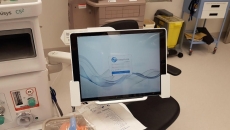Decision Support
Administrative burden is a huge challenge, and technology often exacerbates it. But is there a better way forward? IT is underleveraged as a way to help clinicians spend more time with their patients, says one expert.
There are problems prescribers face with drug-related clinical decision support alerts – but IT can help, and maybe AI, too. Anna Dover, director of product management at FDB, formerly First Databank, provides some answers.
Also, doll-shaped robots have been deployed to solo-living seniors in rural South Korea.
The Mayo Clinic Platform president sees huge potential for artificial intelligence and machine learning, but also recognizes its risks and limitations. The longtime health IT pioneer offers insights into the projects and use cases he's most excited about.
That said, despite its current limitations – it will never replace "empathy, listening, respect, personal preference" – it's clear artificial intelligence is leading to fundamental changes in care delivery, says the IT innovator, who predicts "doctors and nurses who use AI will replace doctors and nurses who don't."
Browse through the very latest case study stories from Healthcare IT News, stories that show how provider organizations are putting all kinds of technologies to use – and achieving significant results.
The cofounder and CEO of Virtuleap describes the company's gamified neuropsychological assessment tool and discusses the company's partnership with Roche to create a VR-based approach to cognitive screening.
It will be initially deployed at Subang Jaya Medical Centre and Bukit Tinggi Medical Centre.
Also, WA Health has started expanding its remote monitoring technology to regional communities.
They're aiming to help ambulatory providers gain insights with help from artificial intelligence, and can surface key information to help develop plans of care based on recommended diagnoses, patient insurance and other information.









